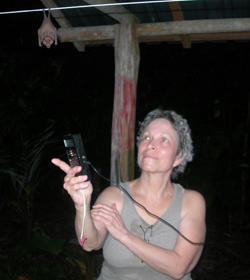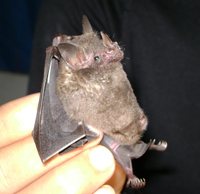Archive
DSU’s Dr. Vulinec Makes her Mark as a Bat Ecologist in Brazil
Friday, September 30, 2011
|
Dr. Kevina Vulinec records a captured fruit bat as part of her Fulbright research project. |
Marvel Comics is not the only place you can find “Batwoman.”
While not counted among the pantheon of superheroes, Dr. Kevina Vulinec, an associate professor of natural resources, believes her missions relating to bat preservation are vitally important to the ecological balance that needs to be maintained.
Dr. Vulinec, who is also known as a bat ecologist, returned last summer from her spring semester in Brazil as a Fulbright Fellow, where she shared her bat expertise with scientists there who are working to preserve species of the fruit bats that are indigenous to that Amazon region.
Fruit bats are so-named because unlike the predominant insect-eating bats in North America, these Brazilian bats eat the fruits of the rain forests and then while in flight expel the fruit seeds back down to the ground, which is important in replenishing the forest.
“I was looking at areas of Brazil forest that have been cut for cattle pasture, interested in the impact on the bat habitat,” Dr. Vulinec said.
However to better understand fruit bat habitat and the foraging habits of the species, Dr. Vulinec spent a lot of her time capturing bat sounds that she believes will help scientists there better identify the different fruit bat species.
“A catalogue of bat sounds exists for North American species, but very few bat calls had been recorded in Brazil,” Dr. Vulinec said.
In Brazil, Dr. Vulinec and scientists of that country set up nets in the forest,captured bats and attached a leash to their legs. Once a bat calmed down (Dr. Vulinec said upon capture, the bats initially were screeching bloody murder) and began sounding its normal bat calls, the scientist recorded its sound.
“The recording device is sensitive and is specifically for high frequencies that humans can’t hear,” Dr. Vulinec said. “Certain species have bat calls that are distinct from others.”
|
A Brazilian fruit bat up close. |
Dr. Vulinec said she has returned to DSU with 200 gigabytes of bat sounds that she will analyze and then share that information with the Brazilian scientists. With that information, scientists there will be able to better understand more about bats, their migration habits, as well as the impact of forest destruction on the species.
While working to help Brazilians with their bat preservation issues, Dr. Vulinec also has challenges to the North American bat population to be concerned with as well.
Because most North American bats are insectivores, these species feast on pesky flying insects, reducing the number around to irritate and vex human populations and farm crops. However, that importance is being challenged by a disease – White Nose Syndrome – that is threatening bat populations.
“White Nose Syndrome” is a fungus that gets on the nose of bats while they are hibernating in caves,” Dr. Vulinec said. “The fungus makes the bats wake up prematurely, and then they fly out of the cave and starve to death because there are no insects out there in the wintertime.”
In addition to be threatened by White Nose, some bats are meeting their makers prematurely at the blades of turbine wind farms. “The bats either get whacked up by the blades circulating at 120 mph or the vacuum that is created causes bats to explode,” she said.
“There will be a big surge in the insect population if the population of bats is reduced,” Dr. Vulinec said.
Dr. Vulinec is in the beginning stages of a collaboration with researchers from Delaware Technical & Community College and the University of Delaware to study and gain a better understanding of White Nose Syndrome.
Dr. Vulinec is also guiding a student who is currently researching golf courses as a possible habitat for bats. “Golf course water hazards are good places for aquatic insects, a source of food for bats,” she said. “Bats really like places with big trees and mower cut grass,” she said.
A DSU faculty member in the College of Agriculture and Related Sciences since 2001, Dr. Vulinec focused her Ph.D. dissertation work on primates and dung beetles. However, upon arriving at DSU, chair Dr. Richard Barczewski directed her to identify a research specialty related to Delaware. That directive moved her into the bat realm.
“Dr. Vulinec has a diverse background in wildlife conservation and biology,” Dr. Barczewski said. “She has been able to take her good mix of experience and make it applicable to our state and region.”
In addition to being an ecologist and scientist, she is also an award-winning artist who actually did scientific drawings to help support herself while in college.



